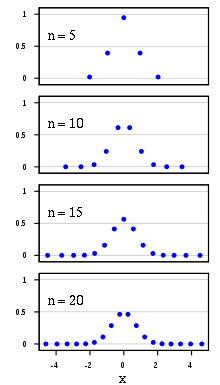Gauss–Hermite quadrature

Weights versus xi for four choices of n
In numerical analysis, Gauss–Hermite quadrature is a form of Gaussian quadrature for approximating the value of integrals of the following kind:
In this case
where n is the number of sample points used. The xi are the roots of the physicists' version of the Hermite polynomial Hn(x) (i = 1,2,...,n), and the associated weights wi are given by [1]
Example with change of variable
Let's consider a function h(y), where the variable y is Normally distributed: . The expectation of h corresponds to the following integral:
As this doesn't exactly correspond to the Hermite polynomial, we need to change variables:
Coupled with the integration by substitution, we obtain:
leading to:
References
- ↑ Abramowitz, M & Stegun, I A, Handbook of Mathematical Functions, 10th printing with corrections (1972), Dover, ISBN 978-0-486-61272-0. Equation 25.4.46.
- Olver, Frank W. J.; Lozier, Daniel M.; Boisvert, Ronald F.; Clark, Charles W., eds. (2010), § 3.5 "Quadrature: Gauss–Hermite Formula" Check
|contribution-url=value (help), NIST Handbook of Mathematical Functions, Cambridge University Press, ISBN 978-0521192255, MR 2723248 - Shao, T. S.; Chen, T. C.; Frank, R. M. (1964). "Tables of zeros and Gaussian weights of certain associated Laguerre polynomials and the related generalized Hermite polynomials". Math. Comp. 18 (88): 598–616. doi:10.1090/S0025-5718-1964-0166397-1. MR 0166397.
- Steen, N. M.; Byrne, G. D.; Gelbard, E. M. (1969). "Gaussian quadratures for the integrals and ". Math. Comp. 23 (107): 661–671. doi:10.1090/S0025-5718-1969-0247744-3. MR 0247744.
- Shizgal, B. (1981). "A Gaussian quadrature procedure for use in the solution of the Boltzmann equation and related problems". J. Comp. Phys. 41: 309–328. doi:10.1016/0021-9991(81)90099-1.
External links
- For tables of Gauss-Hermite abscissae and weights up to order n = 32 see http://www.efunda.com/math/num_integration/findgausshermite.cfm.
- Generalized Gauss–Hermite quadrature, free software in C++, Fortran, and Matlab
This article is issued from Wikipedia - version of the 10/14/2016. The text is available under the Creative Commons Attribution/Share Alike but additional terms may apply for the media files.